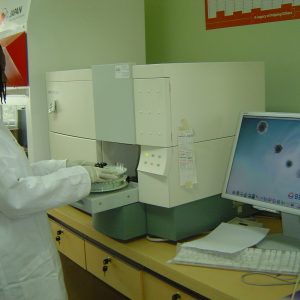CENTRE FOR BIOTECHNOLOGY RESEARCH AND DEVELOPMENT (CBRD) NAIROBI

Overview
The Centre for Biotechnology Research and Development (CBRD) is mandated to undertake basic and biotechnology-related research on human diseases in Kenya, with the overall goal of contributing to the improvement of human health and welfare.
Mission
To improve human health and quality of life through
research, capacity building innovation and service delivery
Vision
To be a leading Centre of excellence in research for human health
Mandates
CBRD is mandated to undertake basic and biotechnology-related research on human diseases in Kenya, with the overall goal of contributing to the improvement of human health and welfare. The Centre’s mandates are:
- To apply modern science and biotechnology to discover, develop and improve tools and strategies for diagnosis, prevention and control of major human diseases in Kenya and the region.
- To improve basic understanding of the biology of disease-causing agents of public health importance in Kenya and the region, including their responses to intervention (e.g. drugs or vaccines), host responses and disease processes (e.g. immunity, pathogenesis, patho-physiology, host-pathogen interactions), and disease epidemiology.
- To coordinate and advise on issues related to basic biomedical and biotechnological research, pre-clinical studies, quality control and bio-safety.
- To provide specialized laboratory services and expertise to the scientific community and the general public.
- To train, mentor and supervise undergraduate and postgraduate students from local colleges and universities.
SERVICES
- Human DNA Identification for paternity testing and identification within the context of disasters and crime scene investigation (Get Service)
- CD4/CD8 testing in HIV/AIDS patients as a service to the scientific community and to the general public.
- Training and mentorship of Master’s and Doctor of Philosophy degree students
- Training in flow cytometry technology
- Research training for university post-graduate students
- Training of university undergraduate and polytechnic students on industrial attachment,
- Supply vertebrate animals (mice, hamsters, guinea pigs) for research or teaching purposes to interested researchers or institutions.
Ongoing Research Activities
Stem Cell Research seeks to develop new diagnostic and therapeutic tools for cancer and diabetes with the goal of reducing the economic burden of medical care, thus making it more accessible
Malaria Research involving malaria prevalence studies and surveillance for antimalarial and insecticide efficacy and resistance in Kenya so as to inform policies on malaria control and treatment through the provision of quality data to ensure that only quality and effective antimalarials and insecticides are in use. Additional research is in the development of new malaria diagnostic tools and of novel antimalarial and insecticidal compounds.
Schistosomiasis Research involves disease surveillance to determine areas where schistosomiasis treatment coverage should be increased as well as development of new more sensitive and cost-effective tools for schistosomiasis diagnosis and control.
Lymphatic filariasis research involving epidemiological surveys on Lymphatic filariasis in Coastal Kenya to determine the impact of Mass Drug Administration (MDA) in this Lymphatic filariasis endemic area and development of a new Point of Care (POC) diagnostic kit for Lymphatic filariasis for use in the resource-limited settings.
Leishmaniasis Research includes disease surveillance and epidemiological studies with the goal of identifying new foci of leishmaniasis transmission and thus control to reduce disease transmission, evaluation of anti-leishmania activity of a novel compound in the mouse model, and in vitro and anti-leishmaniasis vaccine studies.
Forensic Research:
- Characterization of Forensic-Quality Haplotypes Representing the diversity of the Kenyan Population for the development of a Full Mitochondrial Genome Reference Database
- Testing new forensic DNA methods to enhance accountability for sexual violence in Kenya.
Divisions
Schistosomiasis Division
Among the neglected tropical parasitic diseases targeted for eradication/elimination include schistosomiasis and soil-transmitted helminthiases. Currently, 258 million of the world’s population is infected with schistosomiasis ranking it as one of the most common and difficult to control.
Entomology and Ecology Division
Leishmaniasis Division
Leishmania Division is involved in research in Leishmaniasis which includes disease surveillance and epidemiological studies with the goal of identifying new foci of leishmaniasis transmission.
Animal Facility

Dr. Luna Kamau
Centre Director
Dr. Luna Kamau, is a Molecular Entomology and Ecology Researcher with over 22 years of experience in research and training in vector biology and control. She has held numerous research grants in the field of molecular and population genetic studies of disease vectors, vector ecology, and behaviour, insecticide resistance, development, and testing of new tools for vector identification, analysis and control. She is widely published and has played a key role in supervised and mentored students and upcoming scientists in the field. Dr. Kamau also serves as the Deputy Director, Centre for Biotechnology Research and Development at KEMRI. Dr. Kamau is a member of the Kenya National Academy of Sciences (KNAS), a Fellow of the African Academy of Sciences, and a Fellow of The World Academy of Sciences (TWAS).
